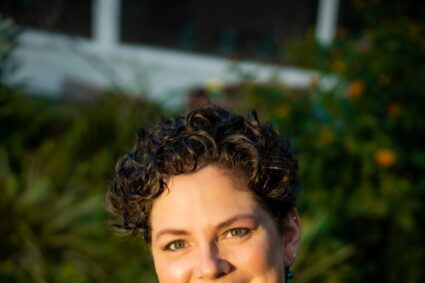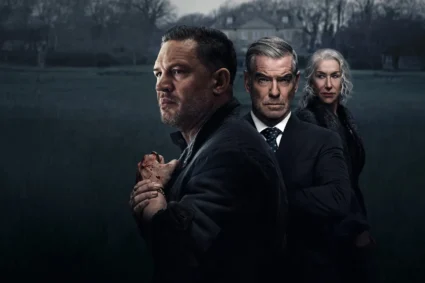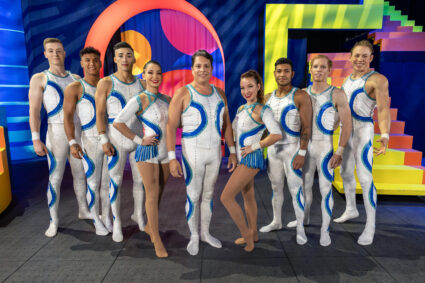Last night, the US Navy Memorial played host to the DC Premiere of the new Netflix docuseries “Bobby Kennedy for President”. Directed by Georgetown alum Dawn Porter, the four-part series brings together rare and never-before-seen archival footage as it reveals what America gained and what it lost in the life, vision, politics, and enduring legacy of Bobby Kennedy. The series comes as its marks the 50th anniversary of Kennedy’s presidential campaign, which ended with his assassination on June 6, 1968.
Before the premiere event, I sat down with Dawn to discuss the wonderful moving series
How much of Robert F. Kennedy did you know before going into to do this docuseries?
You know I would not say I knew all that much. I think I knew what most people know from high school history class. I certainly knew about his assassination. The one thing I will say I did know is how important Bobby Kennedy is to the African American community. In my family there are pictures of the Kennedys around. They were famous for support of civil rights. So, I knew that the history was there but I haven’t really studied and understood the depths of that civil rights relationship. And, that was one of the things that I really wanted to explore in making this series of films.
What were some of the objectives that you wanted to accomplish?
As we started getting into the story, I realized that the time that Bobby Kennedy was running for president, there were a lot of parallels to today. So, it was a very tumultuous time. Vietnam war was raging and separating the country. Then you have racial civil rights protests and you have the country divided over civil rights advances. You also have international relations. You have this cauldron bubbling up with all these types of issues. What emerged was that it was really important to have strong leadership. It was really important for America to have people that we believed in. When you look at today, I am critical of the leadership that we have in the White House for not leading, for not uniting rather to divide. I felt like wouldn’t have been interesting to examine Bobby Kennedy’s legacy, to examine his history and see what lessons we can take for today.
Let’s talk about the wonderful footage we saw in the docuseries. You have your archivist Rich. How did Rich Resmberg get involved and how did you acquire the footage?
Rich is famous in the archive circle. So if you need a good archive, you know 1800-Rich (laughs) I had worked with Rich before on a film called Spies of Mississippi and it was about the Mississippi sovereign commission which was the largest domestic spy operation in the United States history. It was set up by the state of Mississippi to undermine the NAACP – to stop the civil rights movement. Most people have never heard of this. I’ve never heard of it. So I was introduced to Rich by other filmmakers and he did a wonderful job.
When did came up, I had worked at ABC News. I knew that there was a lot of footage that was one 35mm film that had not yet been digitized. One of the things that we wanted to do was try and see if we could get access to some of that footage. We really had to take a risk because we didn’t know if it was going to be footage that we could use and working with Netflix, they had said “Go for it. Go see, go examine, go hunting.” He ultimately examined more than two thousand cans of film. We digitized a hundred forty hours of new footage which I am really proud of that. You mentioned your love of history. I am a history buff as well and what that means is that footage is available to other people as well to study, explore and use it. Hopefully those sources where we got the footage from will make it available to other filmmakers and other people to work and study it.
You have plenty of interviews in the series from Harry Belafonte, Rep. Lewis, Dolores Huerta among others. How did you decide who you wanted to include?
So many people had interacted with Bobby Kennedy but what I wanted to do is not have traditional talking heads taking a look back, I wanted to have people who either worked in his administration or worked for him or with him. It was people like Marian Wright, she was Marian Wright Edelman, who was my common law teacher at Georgetown University.
Wow!
There was a nice circle coming back. Mrs. Edelman was an example of the people that we found. I think when you do that, you have the opportunity to have more of a first person perspective. It’s almost like it’s their film too. It’s their memories. Instead of having somebody commenting on what they have read, you have people living their memories. I think for a film it creates a certain intimacy and that’s what I was going for as a director – to create that intimacy for the audience.
I agree especially since it was 1968 – a tumultuous year in our country. Was it very difficult for the interviewees to open up about the assassination and how they felt when they found out that Kennedy had died?
You know that’s what documentarians do. I have a friend who we joked about that it’s our job to make people cry. It’s not that we want people to be upset but what we want them to do is feel and we want the audience to feel. We want them to bring us back and to bring those times alive. You know that’s also part of selecting your guests and each of these people was incredibly generous of their time and their memories. We spent enough time with them so that they can feel comfortable enough to open up. I wanted the archive footage to be the thing that really grabbed you and the interviews were another layer of depth. The interviews served the archive instead of the archive is usually b-roll for the interviewers and the interviewers are in front. I wanted to flip that around.
And it worked perfectly. From the moment I saw that it immediately drew me. It’s like I can’t wait to see the next episode and more down the road to see how much the archive footage really delves into the story.
As a filmmaker, you always try to find out which technique would serve your story the best and for us, we had this opportunity to do these four episodes for Netflix. It felt like if I could get people to see what beautiful footage there is, maybe it will push them on to the next and the next.
It also wanted to make me explore what happened with the life of Bobby Kennedy because there are so much that I didn’t know about Kennedy when I saw the first episode.
That’s how I felt too. I mean in particularly things I didn’t know. For example, that John Lewis had volunteered for his campaign. Lewis was the person who organized that rally in Indianapolis. When Bobby’s aides say that you cannot address this audience on the day that Dr. King had died, John Lewis said that you must address this audience and Bobby Kennedy listened to him. One of the youngest aides he had addresses the crowd. He was clearly nervous and when you see that footage – there’s a difference to see how clearly uneasy and nerve-racking that must have been for all of them. For Bobby Kennedy, that was one of the first speeches and one of the only speeches that he referred to his beloved brother’s death. So he did that quite deliberately but this was an important enough occasion to say that I really do understand the pain of this. This has happened to me and yet we as Americans have to be bigger than the criminals among us.
Final question: What do you hope audiences will take away?
One of the things that was such a joy in working with all of this archive and being immersed in this time period was seeing that even though things we so difficult, we have been here before. If the country as it pulls together is able to work itself out of hard times, difficult times. There’s also a great lesson about leadership. Bobby Kennedy was not just an intelligent and charismatic leader; he was a compassionate leader. I think that is a great lesson for all of us. One of the favorite quotes from him was when he was addressing students at Columbia University and he says “Hard it is to understand; I like to serve.” and that really just struck me. How much government is about service. It is about service for other people, it is not about your own political personal objectives. I think that we can remember that and we can each ask ourselves how can we serve, what can we do.
“Bobby Kennedy for President” – Now playing on Netflix


